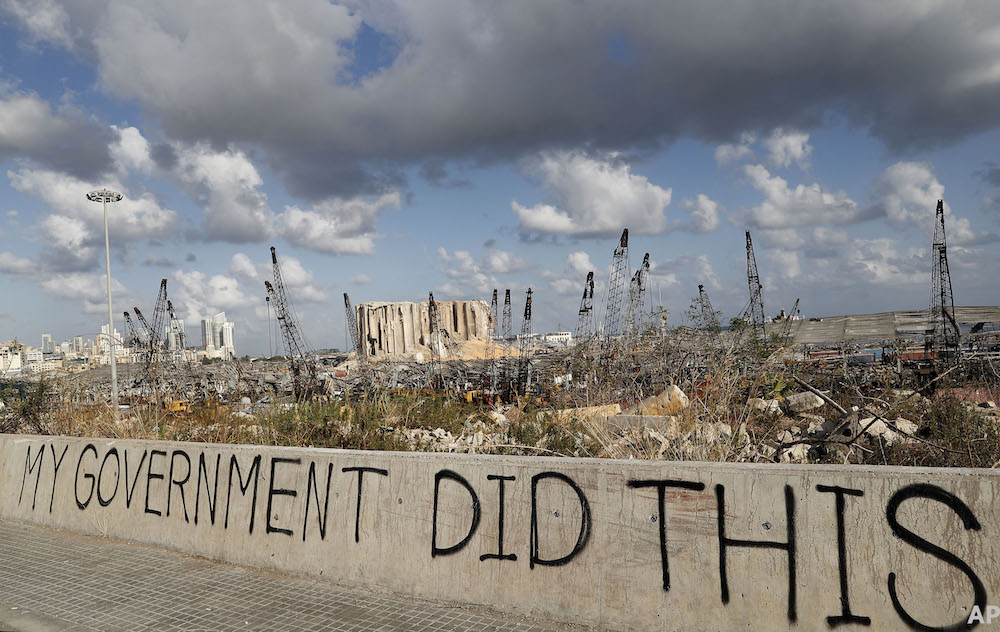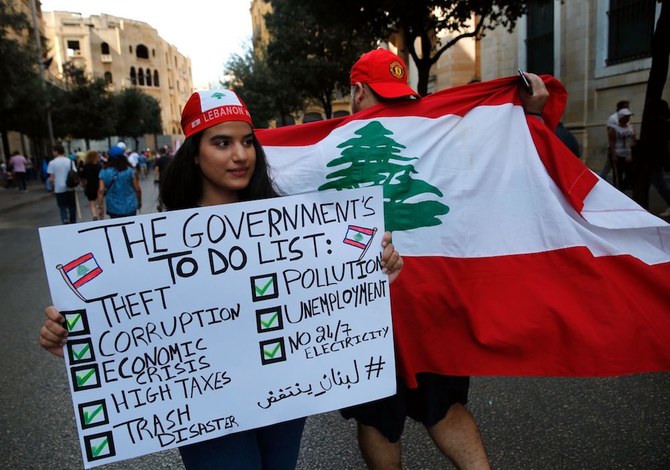LONDON: The political and economic crisis in Lebanon can be resolved, experts say, but it will require collective action, the mobilization of civil society, and the formation of coalitions.
Since the end of the civil war in 1990, corruption among the political elite has undermined Lebanon’s recovery and development, according to Karim Merhej, a researcher and data analyst at The Public Source, culminating in the unprecedented socioeconomic crisis the country now faces.
Lebanon is in a transitional period in which the foundations of the post-civil war political and economic systems are built on the exploitation of resources that should be benefiting the people of the country, Merhej said.
His comments came during a discussion of his newly published research paper, “Breaking the Curse of Corruption in Lebanon,” hosted by Chatham House, a think tank in London.
“This state is built on systemic corruption and non-accountability,” he said. “This system has effectively collapsed and we are in a period where we are not sure what is going to happen yet. Even the political class in Lebanon do not know what is happening — they have gone almost 10 months without forming a government.”
On Monday, billionaire businessman Najib Mikati was chosen to be Lebanon’s new Prime Minister-designate, tasked with forming a government to end a year of political deadlock that has crippled the country. This is the third time he has been elected to the post after previously serving in 2005 and 2011.
He replaced Saad Hariri, who resigned on July 15 after nine months of negotiations with President Michel Aoun about the composition of the new government ending in failure. After his resignation, the Lebanese currency, which had already lost most of its value, hit record lows.
Last month the World Bank said Lebanon is enduring one of the three worst economic collapses since the mid-19th century. More than half the population is believed to be below the national poverty line and children, 30 percent of whom “went to bed hungry or skipped meals” in June, are “bearing the brunt” of the crisis, the institution said.

Words are written by Lebanese citizens in front of the scene of an explosion that hit the seaport of Beirut, Lebanon, Sunday, Aug. 9, 2020. (AP)
Merhej’s paper examines the anti-corruption laws in Lebanon, investigates why they are not working, and offers recommendations for action by the government, the international community and civil society.
“Lebanon’s anti-corruption initiatives, culminating in the recent adoption of the National Anti-corruption Strategy, are destined to be ineffective,” he writes.
“The Lebanese political elite unveiled these initiatives to the international community, as well as the Lebanese electorate, following the uprising of late 2019 and early 2020 in order to rehabilitate their tarnished image, and in some cases to acquire much-needed international funding.”
Merhej said that while the strategy and new laws might look commendable on paper, they are likely to be poorly implemented because of “a lack of political will among Lebanon’s ruling elites to engage in transparency, the absence of an independent judiciary, the use of state resources to benefit the private interests of the elites, the use of bureaucracy to make laws unimplementable, and the fact that the ruling elites are the custodians of the country’s broad anti-corruption strategy.”
The fight against corruption requires great effort and will not achieve results overnight, he warned. The government must prioritize the formation of the National Anti-Corruption Commission, he added, and ensure the judiciary is independent and not tied or subservient to the political class.
“We have seen a lot of collective organizing in the past two-to-three years, particularly after the October uprising in 2019, and we have seen the emergence of alternative syndicates (and) grassroots organizations and initiatives to protect free speech,” he said.
A lot of funding is flowing into Lebanon, with more expected, Merhej added as he called on the international community to implement transparency strategies to ensure aid goes directly to the people who need it and not into the pockets of corrupt officials.
Diana Kaissy, director of civil society engagement at the International Republican Institute in Lebanon, agreed that greater transparency is needed, particularly for parliamentary committee meetings, which are held behind closed doors and the minutes are not released to the public.
“We need to be sitting at the table, being part of these consultations, drafting these laws, so we make sure that they are laws that can be used (and) they are not toothless, they do not have loopholes,” she said.
Not all government officials are corrupt, Kaissy added, and a multi-stakeholder approach must be adopted that capitalizes on key players.
Little by little, she said, eventually it will be possible to make the changes people want. “I currently see no other way, and that is maybe what is keeping us hopeful and working the whole time,” she added.
Badri Meouchi, a corporate governance consultant with Tamayyaz, said countries or institutions that want to support anti-corruption efforts in Lebanon should work closely with the media, civil-society groups, private-sector organizations, and others in the public arena. Elections are also important, he said, but there are major challenges to overcome.
“We need to organize ourselves better, as well as financially, because they are very well organized (and) have amazing financial resources at their disposal, and we need to become more creative than they are — because they’re very creative,” he said.
Lebanon is set to hold separate municipal, parliamentary, and presidential elections next year.
There is hope, however, in what is happening on the ground, he added.
“What has changed in the past two years, which is encouraging, is that the formula of fear has changed,” Meouchi said. “It used to be, a couple of years ago, that if a politician entered a public place everyone wanted to shake their hand and be seen with them.
“Today you have citizens who are emboldened and this is a new factor in the fight against corruption, because there is only so much that we in civil society can do.”


























